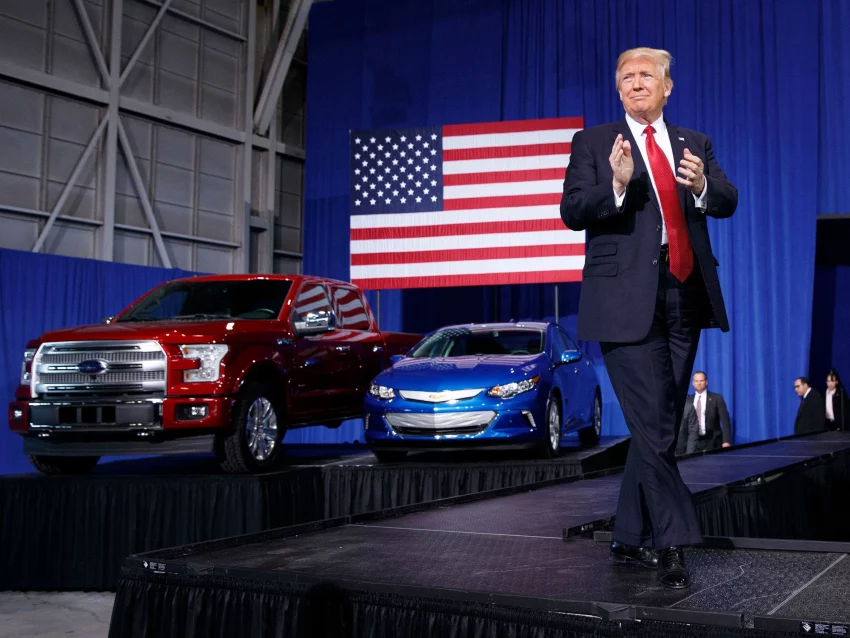The escalating trade tensions between the United States and China have had a significant impact on the global automotive industry, with Mexico emerging as a key player in the midst of this complex dynamic.
China’s Electric Vehicle Exports Face Tariff Hurdles
Chinese-made electric vehicles (EVs) face a significant disadvantage when entering the US market due to hefty tariffs. These tariffs include the 2.5% general tariff imposed on all imported cars and the additional 25% tariff imposed by the Trump administration in 2018 on Chinese-made vehicles. This brings the total tariff burden to 27.5%.
In contrast, cars produced in Mexican factories enjoy a much lower tariff rate of just 2.5%. Moreover, under the strict local content requirements of the 2020 US-Mexico-Canada Agreement (USMCA), these cars may even enter the US duty-free. The USMCA mandates that 75% of a car’s components must be manufactured in Mexico, the US, or Canada to qualify for zero tariffs.
Industry Leaders Speak Out Against Tariffs
The US manufacturing industry has expressed strong opposition to the tariffs imposed on Chinese EVs, arguing that they are harming American manufacturers and jeopardizing global trade liberalization. Jay Timmons, president of the National Association of Manufacturers (NAM), the largest manufacturing trade association in the US, has warned that these tariffs could lead to retaliation from China and further damage the global trade system.
Mexico’s Automotive Industry Sees Opportunities
Mexico, the world’s seventh-largest auto producer and fifth-largest auto parts producer, is capitalizing on the trade tensions by positioning itself as an alternative manufacturing hub for automakers seeking to avoid US tariffs on Chinese goods. The country’s automotive industry accounts for 3.8% of Mexico’s GDP and 20.5% of manufacturing output.
Mexico is actively promoting the transition to EVs, aiming to have half of its auto production electric by 2030. The country’s rich lithium reserves, a crucial raw material for EV batteries, make it an attractive location for EV production. Additionally, the Mexican government is seeking to collaborate with other countries to expand lithium-ion battery production for automobiles.
Mexico’s Status as US’s Top Trading Partner at Risk
While Mexico surpassed China as the US’s top trading partner in 2023, this position could be jeopardized if former US President Donald Trump returns to power. According to Keith Macroeconomics, a British economic research consultancy, Trump’s threats to renegotiate or scrap the USMCA put Mexico’s new status at risk. If this occurs, it could further strain US-Mexico relations, adding to the existing border security concerns.
Chinese Investment in Mexico Faces Scrutiny
Even under a Biden presidency, Chinese auto parts and vehicle manufacturers investing in Mexico face potential challenges. Reports indicate that the US has expressed concerns to Mexico regarding the presence of Chinese automakers in the country. Mexican officials acknowledge the need to carefully consider Chinese investments due to the potential to strain relations with the US.
The US manufacturing industry has urged the Biden administration to take action to prevent the import of Chinese-made vehicles and parts from Mexico, arguing that this could threaten the survival of US automakers.
Mexico: A Risky Passage for Automakers?
Despite its potential as a gateway for automakers to access the US market, Mexico’s role in this dynamic remains uncertain, regardless of whether Biden or Trump is in power. As Keith Macroeconomics’ chief economist Neil Shearing notes, “Investors may be concerned about the potential return of Mr. Trump and the threat of renewed trade tensions, but regardless of whether the next government is Democrat or Republican, this conflict appears increasingly likely.”
The future of the automotive industry in Mexico and its role in the US-China trade tensions will undoubtedly be shaped by the complex interplay of economic, political, and geopolitical factors. Automakers and investors will need to carefully navigate this evolving landscape to make informed decisions about their strategies.
Additional Points to Consider:
- The potential impact of the US Inflation Reduction Act on the EV market and Mexico’s position as a manufacturing hub
- The role of labor unions and worker rights in shaping the automotive industry landscape in Mexico
- The environmental implications of increased auto production in Mexico, particularly in terms of air and water pollution
Overall, the US-China auto trade tensions have created a complex and challenging environment for the automotive industry in Mexico. While the country presents opportunities for automakers seeking to avoid US tariffs on Chinese goods, it also faces risks associated with potential trade disputes, political scrutiny, and environmental concerns. Automakers and investors will need to carefully assess these factors as they navigate the evolving dynamics of the global automotive market.

